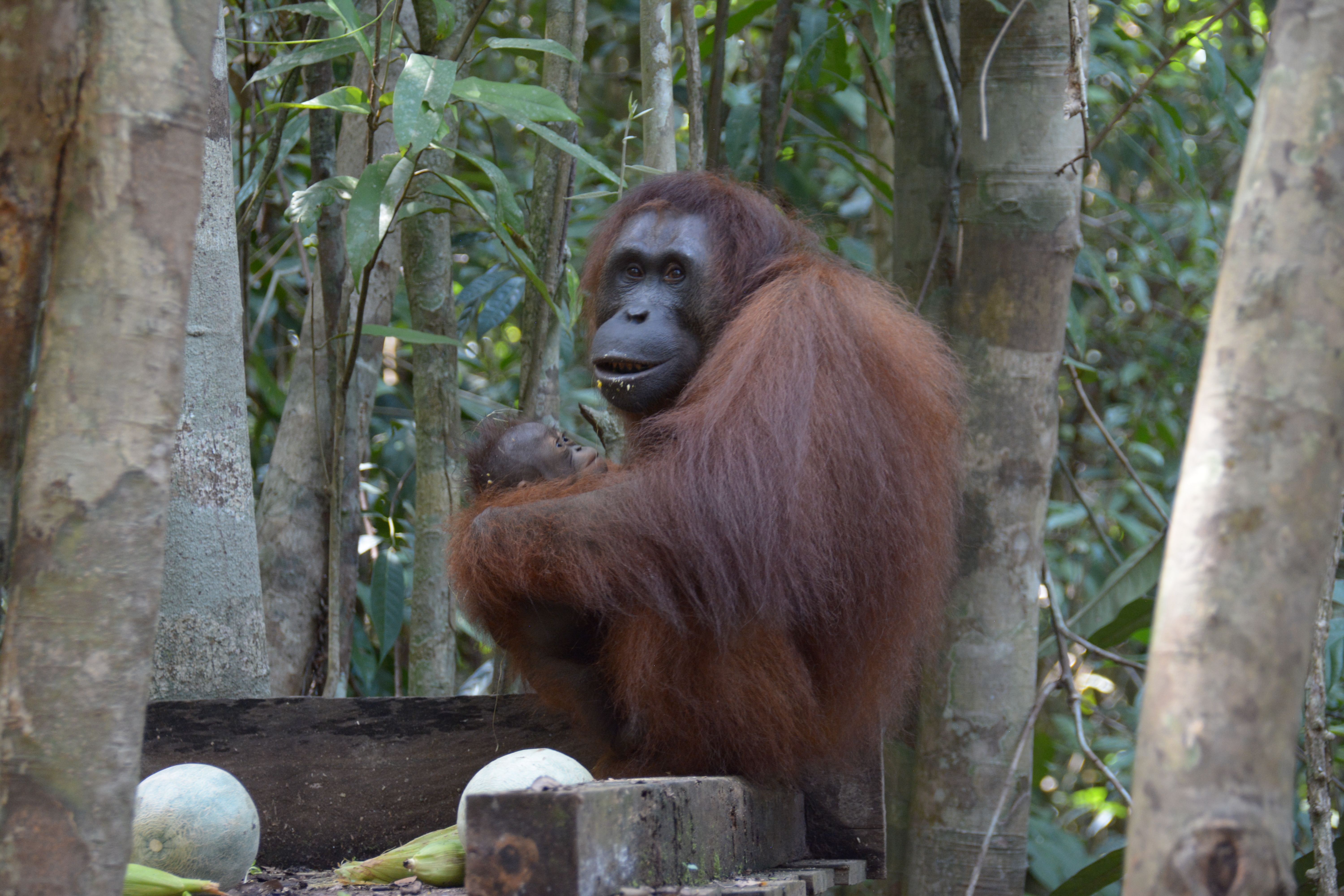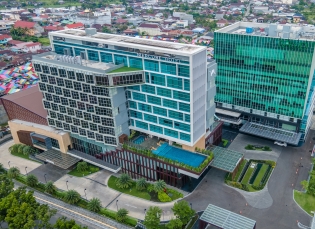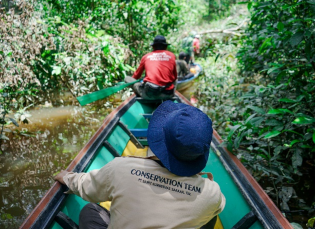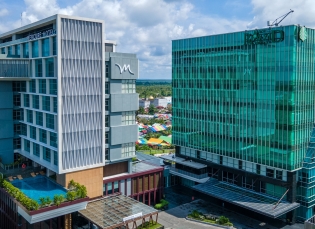Increasing Orangutan Population on Salat Island

Commitment of palm oil companies to preserve orangutans is resolute, including PT Sawit Sumbermas Sarana Tbk. (SSMS) who establishes Salat Island and has proven the increase of orangutan population on the island.
The earth is not just for human, it must share with other living beings, for the biodiversity to exist. That determination is carried by PT Sawit Sumbermas Sarana Tbk. (SSMS) as one of the oil palm companies committed to preserve orangutans.
Orangutans not only share 97% of the same DNA with human, but they also have important functions as umbrella species where their existence is an indicator of the quality of Indonesia's biodiversity, especially the tropical rain forests of Borneo.
But preserving orangutans is not as easy as turning a hand, because orangutans have needs that are not different from humans, that is, a home.
"So not only humans who need home, orangutans also need one," said Kinanti Alif, one of SSMS sustainability representatives.
Kinanti explained due to various factors that causing environmental degradation especially the forests, many orangutans are displaced. Even at a very early age, many baby orangutans have lost their mothers and end up in the hands of humans as pets. Whereas in accordance with the Constitution no 5 of 1990 that wildlife must be protected and should not be kept as pets thus can be preserved.
SSMS with its partner Borneo Orangutan Survival Foundation (BOSF) and Natural Resource Conservation Agency (BKSDA) along with Local Government of Pulang Pisau Regency together to manage Salat Island for orangutan reintroduction process before being returned to their habitat.
"After being approved by BKSDA, the rescued orangutans were taken to Nyaru Menteng to be introduced, later they would be translocate to Salat Island to continue the reintroduction process to the pre release stage. One of the orangutans inhabiting Salat is named Buntok (female), who was rescued from Buntok, South Barito Regency, "said Kinanti. In Nyaru Menteng, according to Kinanti, every orangutan is trained on their natural character and prepared to live independently once they are released so they can carry out their function as an umbrella species.
Orangutan School in Nyaru Menteng
However, to regenerate orangutan natural character is not easy and they need to go through several stages. First stage is baby school (toddler class) for baby orangutan with age 0-4 years. In this baby school, the orphaned orangutans are taught basic skills such as climbing and spending most of their time in a tree, looking for food and making their own nest, recognizing and avoiding dangers like snakes and how to socialize with each other.
In that case the trees height in baby school is not more than 10 meters. This is important because the bones of the baby orangutans are still very young, with plants that are not too high then if the orangutans fell it will not be harmful.
At the age of 4 years the orangutans enter the second stage: the forest school. In this stage orangutans are taught the same basic skill but with more challenges like a higher, more densed , and usually the trees diameter in the forest school is larger because orangutans have strong arms and can easily break the tree. The purpose is when released in the wild orangutans would have adapted well. Although forest school is reserved for orangutans aged 4-9 years, it does not close the possibility for younger but more skilled orangutans to directly enter forest school.
After graduating from the forest school, orangutans then enter the pre release stage in Salat Island. The island of 2,085 hectares is bought and managed by SSMS and its partners, BOSF. Salat island has a endhemic and excellent forest cover for orangutans to learn to live in the wild before being released in their natural habitat. "On Salat Island, orangutans are not fed with as many fruits as in Nyaru Menteng. This is to encourage them to fulfill their own food needs so that when they are released the orangutans can become self-sufficient," added Mas Untung, Deputy Manager for BOSF Pre Release Program.
Untung further explained, in Salat Island the technicians observe and monitor orangutans development. On pre release island, female orangutans will be fitted with contraception implants. "The goal is for orangutans to focus on preparing for their life in the wild and hopefully can conceive the children and give birth in the wild," claimed Untung. But, Untung admitted, in some cases there are also orangutans who get pregnant at the pre release island. For example Buntok, who got pregnant and gave birth in Salat Island before she is released to their habitat.
"So if there are orangutans who are pregnant and give birth in this pre release area then we give the time a few months to adapt together with the baby before can be released in the wild. Because baby orangutans at birth are still vulnerable to the danger outside, "said Untung.
Buntok herself was transferred to Salat Island in May of 2017, and gave birth to her first male child in February of 2018. SSMS named this baby orangutan Borneo as a tribute to the nature where this baby orangutan was born and where all the SSMS operational unit is located on the island of Borneo.
But not long after his birth, Borneo was affected by itching from Rangas tree sap. Borneo and Buntok the retrived back to Nyaru Menteng to get treatment. "However after the itches disappeared Borneo and his mother Buntok returned to the island of Salat to continue to prepare for their release into the wild," said Untung.
Desi Kusumadewi, Head of Sustainability SSMS added, Salat Island is not just to preserve orangutans in the area, but also knowing that the area for orangutans has been decreasing so that required additional land for reintroduction. "The plans are also for old orangutans or those who are disabled to be able to stay on Salat Island which will be used as a sanctuary for orangutans that cannot be returned to the wild," Desi promised.
Additionally, Desi said SSMS does not only join the efforst to preserve orangutans but also commited to help people around Salat Island through economic and social empowerment programs.
"We have been involving the community since the initiation of Salat Island Project, so that there is awareness of all parties of the importance of environmental sustainability including the orangutans conservation in it and to grow a sense of ownership of this project. Even independent smallholders who are partners of SSMS are also assisted in conducting sustainable certification, either for Indonesia Sustainable Palm Oil (ISPO) or Rountable Sustainable Palm Oil. "said Desi.
Text by Yuwono Ibnu Nugroho, as appeared in Perkebunan News July 16th 2018 (https://perkebunannews.com/2018/07/16/pulau-salat-turut-mendongkrak-populasi-orangutan/) and Media Perkebunan Magazine July 2o18. Translated by Kinanti Alif, SSMS.




